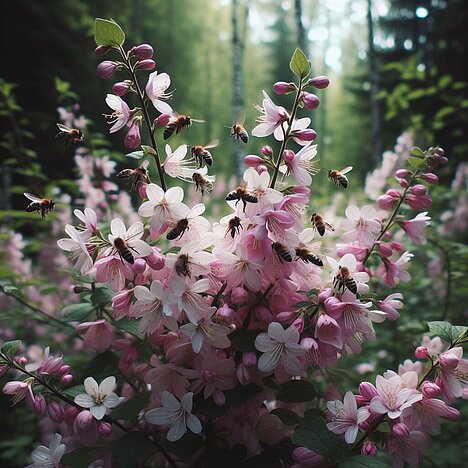Deutzien

Deutzias, also known by the botanical name Deutzia, are a genus of about 60 species of shrubs native mainly to East and Southeast Asia, with some species found in Central America. They are popular in gardens around the world for their gorgeous flowers and low-maintenance nature. While these shrubs are a feast for the eyes and add an aesthetic touch to any garden, it's important for dog owners to understand the impact these plants have on their four-legged friends. In this article, we take an in-depth look at deutzias and their compatibility with dogs.
What are deutzias?
Deutzias belong to the hydrangea family (Hydrangeaceae) and are predominantly deciduous shrubs. They vary in size and can grow between 1 and 3 meters high. In spring and early summer, deutzias adorn themselves with an abundance of flowers, ranging from white to pink to purple. The flowers are small, numerous and often star-shaped, arranged in loose or dense clusters. These plants are valued not only for their floral splendor, but also for their hardiness and ability to thrive in a variety of soil types and site conditions.
Advantages of deutzias in the garden
Aesthetic value
With their lush flowers and dense foliage, deutzias offer a great way to add color and texture to the garden. They are ideal as ornamental shrubs in flower beds, as hedges or even as specimen plants.
Easy to care for
Deutzias are relatively easy to care for, making them a good choice for garden owners who want to invest little effort in garden maintenance. All they need is well-drained soil and a location with sufficient sunlight to thrive.
Bee and butterfly magnet
Deutzia flowers attract bees, butterflies and other pollinating insects, which contributes to the biodiversity of the garden.
Potential risks for dogs
Toxicity
Although deutzia is not considered highly toxic to dogs, parts of the plant, particularly the leaves and flowers, can cause gastrointestinal distress if consumed in large quantities. Symptoms of mild poisoning may include vomiting, diarrhea and lethargy.
Physical injuries
The twigs of some Deutzia species can be sharp and cause skin or eye injuries to dogs if they come into close contact with them, especially if they run through dense bushes.
Precautions for dog owners
Supervision
Watch your dog carefully when he is around deutzias, especially if he tends to chew on plants. Make sure he does not nibble on the bushes.
Choice of plants
If you want to create a dog-friendly garden, find out about the specific Deutzia species you want to plant and choose those that are considered safe for dogs.
Training
Train your dog not to chew or eat plants to minimize the risk of potential poisoning.
Deutzias are undoubtedly an asset to any garden, but offer potential risks to curious dogs. While the risk of severe toxicity is low, it's still important to exercise caution and take preventative measures to ensure your garden remains a safe place for your four-legged friend. With proper supervision and care, deutzias and dogs can live in harmonious coexistence in your garden, each enjoying the beauty of the other in a safe manner.
If you notice any signs of hypersensitivity or poisoning in your dog, you should see your vet immediately. We are not a substitute for a vet, but we try to be as accurate as possible. Every dog reacts differently and we recommend you get a second opinion or consult your vet if in doubt.
Stay healthy and take good care of your four-legged friend!😊
Similar to Deutzien
Lilac (Syringa vulgaris) belongs to the olive family (Oleaceae) and is mainly native to Europe and Asia. This perennial plant is characterized by its lush flower clusters, which can appear in a...
Forsythia, also known as the golden bell, belongs to the olive family (Oleaceae) and is mainly native to East Asia. The plant is cultivated as an ornamental shrub in many parts of the world and is...
Weigelia belong to the honeysuckle family and comprise around 12 species of deciduous shrubs originally from East Asia. They are particularly prized for their long-lasting and colorful flowers,...
The pipe bush (Philadelphus) belongs to the hydrangea family and is best known for its highly fragrant, white flowers that appear in late spring and early summer. The name "pipe bush" is derived...



